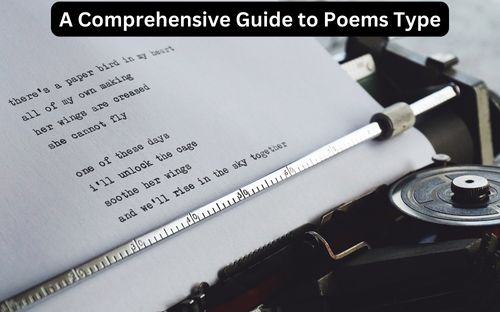
In the realm of artistic expression, poetry stands as an illustrious testament to human creativity. One cannot help but be captivated by the diverse forms poetry takes. Today, we embark on a journey into the heart of poetic diversity with a focus on "Poems Type."
Poetry is an ever-expanding universe of emotions, thoughts, and imagery. Each poetic form, like a celestial body, brings its unique light to this vast cosmos. Let's delve into the intricacies of various "Poems Type" to unravel the beauty within.
The sonnet, a timeless form, has graced the pages of literary history for centuries. Whether it's the Shakespearean sonnet's distinctive rhyme scheme or the Petrarchan sonnet's eloquent expression of love, these fourteen lines encapsulate a moment, an emotion, or a narrative with unparalleled precision.
Example: In this Shakespearean sonnet, the poet skillfully weaves a tapestry of love and longing within the structured confines of fourteen lines, showcasing the enduring power of "Poems Type."
Originating from the Japanese tradition, Haiku is a poetic gem known for its brevity and evocative nature. Comprising three lines with a 5-7-5 syllable structure, Haiku distills the essence of a moment, often capturing the beauty of nature or the depth of human emotion.
Example: This Haiku, inspired by the changing seasons, exemplifies the artistry of "Poems Type" in painting vivid images with minimal words.
Free verse, a rebellion against traditional structures, offers poets the freedom to explore uncharted territories. Devoid of strict rhyme or meter, free verse is a canvas where emotions flow unbridled, allowing poets to craft their unique rhythms and cadences.
Example: In this free verse exploration, the poet breaks free from the constraints, letting emotions spill onto the page in a raw and authentic expression of self, showcasing the limitless potential of "Poems Type."
For those who seek humor and playfulness, limericks provide a delightful playground. With their distinctive AABBA rhyme scheme, these short, whimsical verses narrate amusing tales, demonstrating how "Poems Type" can be both entertaining and light-hearted.
Example: Explore the joyous rhythm of limericks in this whimsical piece, where the poet invites readers to join in the laughter and revelry that "Poems Type" can evoke.
The Villanelle, a structured dance of nineteen lines, is characterized by the repetition of specific lines. This repetition creates a hypnotic effect, allowing poets to delve into complex emotions and themes while maintaining a musical quality throughout.
Example: In this Villanelle, the poet masterfully navigates the intricate dance of repetition, exploring the depths of love and loss within the structured embrace of "Poems Type."
Why "Poems Type" Matters:
Beyond being an academic pursuit, understanding the various "Poems Type" enriches our ability to appreciate the art of poetry. It serves as a reminder that each form is a tool for poets to convey thoughts, emotions, and narratives uniquely.
Incorporating "Poems Type" into Your Craft:
Incorporating "Poems Type" into Your Craft: Whether you are a seasoned poet or just beginning your journey, experimenting with different "Poems Type" can elevate your craft. The key is to find the form that resonates with your voice and the emotions you wish to convey. The versatility of "Poems Type" ensures there is a poetic form for every mood and message.
To enhance your website's SEO, seamlessly integrate the phrase "Poems Type" into your content where it fits organically. This not only aligns with SEO best practices but also ensures that your content remains authentic and reader-friendly.
Example: Within the lyrical verses of this poem, the poet demonstrates the seamless integration of "Poems Type," creating a harmonious blend of expression and optimization.
Optimize your meta tags by strategically including "Poems Type." Craft a compelling meta description that not only piques the interest of potential readers but also signals to search engines the rich exploration of poetic forms on your website.
Example: Embark on a poetic journey through the diverse landscape of "Poems Type." Uncover the beauty of sonnets, Haiku, free verse, limericks, and Villanelles as we delve into the heart of poetic expression.
Extend the conversation beyond the technicalities of poetic forms. Share personal insights, anecdotes, or experiences related to the various "Poems Type." Engaging content not only captivates your audience but also signals to search engines that your website provides valuable and relatable information.
Example: Join the poet on a personal journey as they share the influence of "Poems Type" on their creative process. Discover the emotional landscape shaped by the structured dance of Villanelles or the liberating flow of free verse.
Collaborate with fellow poets, writers, or literary enthusiasts to build backlinks. Guest posts, interviews, or collaborative projects can help create a network of links related to "Poems Type," enhancing your website's authority in the eyes of search engines.
Example: Explore diverse perspectives on "Poems Type" through collaborative projects with fellow poets. These connections not only enrich your understanding but also contribute to the broader conversation about the magic of poetic diversity.
In the tapestry of poetry, "Poems Type" weaves a rich and colorful pattern. Each type is a brushstroke on the canvas of literary expression, contributing to the beauty and diversity of the poetic landscape. As we explore the nuances of sonnets, Haiku, free verse, limericks, and Villanelles, let's celebrate the power of words to evoke emotions and paint vivid images in the minds of readers.
Embrace the diversity of "Poems Type," and let your words dance across the pages of your poetic journey. Remember, the magic of poetry lies not only in the words but also in the genuine connection you forge with your audience.
Embark on this SEO-optimized journey with "Poems Type," and let your poetic voice resonate across the digital landscape. May your exploration of diverse poetic forms inspire others to embark on their own poetic adventures.